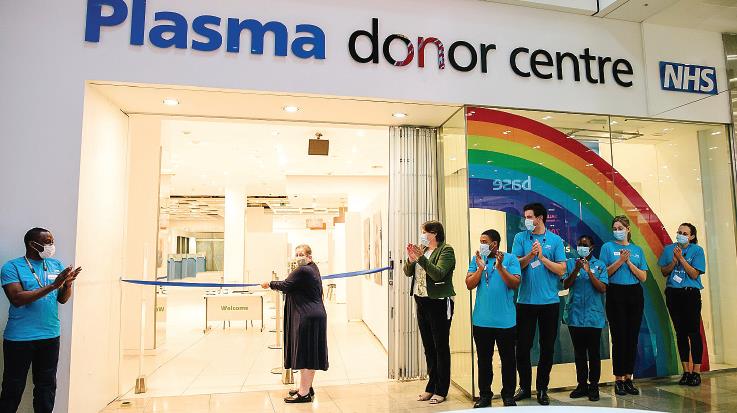London opens COVID-19 plasma pop-ups


This week nurses started collecting so-called liquid gold from COVID-19 survivors at a new pop-up donor center located in a vast mall in East London.
Sandwiched between a hair salon and a kids’ clothing store in the Westfield Stratford City shopping center, the new facility is part of a trial across the United Kingdom exploring the use of convalescent plasma as a treatment for novel coronavirus infection.
Plasma is the yellowish liquid that shifts red and white blood cells through the circulatory system, and the convalescent kind is rich in disease-fighting antibodies from newly-recovered patients.
There is evidence that donations of this plasma can help treat severe bouts of COVID-19 infection, and the National Health Service in the UK is currently asking volunteers to take part in clinical trials to confirm the safety and effectiveness of the transfusions.
Ann Kitchen, a 63-year-old from South London, cut the ribbon at the opening ceremony for the new pop-up donor center at Westfield. Kitchen was the first person in the UK to receive convalescent plasma as a treatment for COVID-19.
Kitchen fell ill in late April and was admitted to Guy’s and St Thomas’ hospital where she deteriorated quickly. Doctors gave her the option of participating in a landmark trial for convalescent plasma, which ultimately led to her recovery and discharge from the hospital in mid-May.
“Within a couple of days of having that plasma, I started to feel a lot better,” said the mother-of-seven, who describes the treatment as “l(fā)iquid gold”.
Since Kitchen, around 350 COVID-19 patients have received plasma as part of the trial, which relies on donations from people who have recovered from the illness.
The pop-up at Westfield is the third temporary donor center to open in London in recent weeks, in addition to three permanent facilities in the capital. People who have had COVID-19 can now donate their antibody-bearing plasma in 20 cities across the UK.
Plasma transfusions are common in the treatment of certain blood disorders, and researchers have explored the use of convalescent plasma to treat various infectious diseases including influenza, Ebola virus, SARS, and MERS.
Results from trials conducted in China, Italy and the United States indicate that convalescent plasma could serve as a promising rescue option for severe cases of COVID-19.
David Roberts, who is an associate medical director at NHS Blood and Transplants, said that the plasma with the most antibodies tends to come from people who were more ill. For this reason, there is a particular need for recovered donors who are male, or who are aged more than 35, or who were hospitalized. Their plasma is most likely to be able to save lives, according to Roberts, who said that convalescent plasma donation is “safe and easy”.
“If you get the call, please donate, help your NHS fight COVID-19,” Roberts said. “We know many people who can donate will have been through a difficult experience and we are very grateful for their help.”
a
































